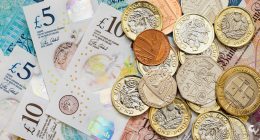MILLIONS of households face bill hikes after the Bank of England (BoE) upped its base rate.
The rate has gone up by 50 basis points from 3% to 3.5% as expected.
It’s the ninth time in a row that the BoE has raised interest rates and they are now at a 14-year high.
It follows the biggest single hike from 2.25% to 3% in November.
The move will make the cost of borrowing, including loans, credit cards and mortgage repayments more expensive.
High-street banks use the BoE base rate to work out the interest rates it offers to customers.


It means millions of households face higher mortgage bills – but the BoE’s outlook for the economy has improved.
Traders are now predicting interest rates will peak at 4.5% next year.
The BoE said inflation is expected to continue to fall gradually over the first few months of 2023.
It has reduced its inflation forecasts by 0.75 percentage points on the back of government energy support.
Most read in Money
In a letter to Chancellor Jeremy Hunt, BoE governor Andrew Bailey said the Bank thinks inflation has peaked.
It said that its “latest projections suggest that twelve-month CPI inflation has reached its peak” but it will remain high for the next 12 months.
The current rate of inflation is 10.7% after falling from 11.1% in October.
The bank is tasked with keeping inflation at 2%.
Hiking interest rates is a way of trying to reach this target.
The Bank also said that the economy is now expected to do better in the final three months of 2022 than it had previously thought.
Gross domestic product (GDP) is forecast to fall by 0.1% in the fourth quarter, compared with the previous forecast of a 0.3% drop.
Last month it said the UK was heading for the longest recession in 100 years.
But, the hike is good news for savers as they may get better rates on their nest egg.
Lifting interest rates is meant to encourage people to save, rather than spend, which in theory should help bring rampant inflation under control.
Inflation is a measure of how the price of goods and services has changed over the past year.
So, prices are still rising, but at a slower rate than last month when they were rising at their fastest rate in 41 years.
Alice Haine, personal finance analyst at Bestinvest, said: “An interest rise less than 10 days before Christmas might feel like a blow for struggling households.
“But the 50-percentage point hike signals a slower pace of monetary tightening following the 75bps increase last month – the biggest single increase since 1989 – offering a glimmer of hope that the mood is shifting.
“Increasing interest rates when the economy is on the brink of a recession might not be typical behaviour for a central bank, but the Bank of England is intent on taming double-digit inflation and bringing it closer to its target of 2%.”
Here are the main ways that today’s announcement could affect your finances.
Mortgage rates rising
Mortgage rates have generally been rising with the BoE’s consecutive rate rises since last December.
But the exact amount that mortgage repayments rise will depend on the type of mortgage you have.
If you’re on a fixed-rate mortgage, the increase won’t immediately affect your payments.
Rates on these types of mortgages have shot up in recent months, but then started falling and recently dipped back below 6%.
The average two-year fixed deal is 5.84% and the average five-year deal sits at 5.67%, according to Moneyfacts.
But this is still far higher than the average rates of 2.34% a year ago.
Other mortgages, such as a tracker or standard variable rate (SVR) mortgage, could be impacted straight away.
Tracker mortgages are linked to the BoE base rate – which means you will see an immediate impact on your mortgage repayments after the BoE rate hike.
Homeowners on standard variable rate mortgages won’t see their repayments go up straight away, but they will likely increase shortly after today’s hike.
Your bank should tell you about a change to your SVR before it goes up.
SVRs are generally higher than fixed rate deals, so if you’re on one then you’re likely already be paying more than you need to already.
Around 2.2million households are on SVRs and the 0.5 percentage point hike today will add £62 a month to mortgage bills – or £744 a year.
That’s based on borrowing of £250,000, according to calculations by TotallyMoney.
But the exact amount depends on your borrowing and your loan-to-value.
While anyone on a fixed deal won’t see a change now, they could find rates are higher when they look for a new deal.
Although rates have fallen slightly in recent weeks they are still higher than the record low rates available last year.
The Bank of England already warned this week that four million households could face £3,000 a year average bill hikes with a 3.5% interest rate rise.
People with fixed-rate mortgage deals due to expire at the end of 2023 face £250 a month bill hikes when they are forced to refinance on to a higher rate.
The exact amount more will depend on the size of the mortgage and the loan-to-value among other factors at the time of re-mortgaging.
Rachel Springall, finance expert at Moneyfacts, said: “This latest base rate rise will be disappointing news to borrowers who are already facing a cost of living crisis and recent turmoil surrounding mortgage interest rates.
“Consumers may breathe a sigh of relief to see fixed mortgage rates have started to drop in recent weeks and hope these rates will fall further.
“However, the cost to secure a new fixed deal is much higher than they may realise, as both the average two- and five-year fixed rates have increased by over 3% during the past year.
“The erratic behaviour in mortgage pricing makes it essential for borrowers to seek advice to scrutinise all the options available to them.”
She added that fixed rate mortgages could fall further, prompting borrowers to wait and see what happens over the coming weeks.
Credit card and loan rates could rise
The cost of borrowing through loans, credit cards and overdrafts will go up too, as banks are likely to pass on the increased rate.
After consecutive rate rises by the BoE interest rates on credit cards and personal loans have already hit a record high, according to Moneyfacts.
Many big banks – like Lloyds Bank, MBNA, Halifax and Barclaycard – link their credit card rates directly to the Bank of England base rate.
That means their credit card rates will hike automatically in line with any changes to interest rates – but you’ll be given notice before this happens.
You can check the terms and conditions of your credit card to see if the rate can go up when the base rate does.
Certain loans you already have like a personal loan or car financing will usually stay the same, as you’ve already agreed on the rate.
But rates for any future loan could be higher, and lenders could increase the rate on credit cards and overdrafts – although they must let you know beforehand.
You can cancel a credit card if you want and will have 60 days to pay off any outstanding balance.
Savers might get better rates
Savers will get some relief as banks continue to battle it out by offering market-leading interest rates.
A rate rise is generally good news for savers, especially after a long stretch of getting very low rates on their money.
Along with low rates, high inflation can erode away the value of any savings you have.
So if you have £100 in the bank this year and inflation is 10%, the real spending power of that money is reduced to £90 next year.
Another rate rise could see banks pass on higher rates to savers – though they are usually much slower to act than with passing on higher rates for borrowing.
This means savings rates are more likely to edge up slowly rather than change immediately.


Do you have a money problem that needs sorting? Get in touch by emailing [email protected]
Anyone currently getting a low rate on easy access savings could find it’s worth looking around for a better rate after any rate rise and moving their money.
A money expert shared with The Sun how to stop soaring interest rates eating away at your savings.
This post first appeared on thesun.co.uk









